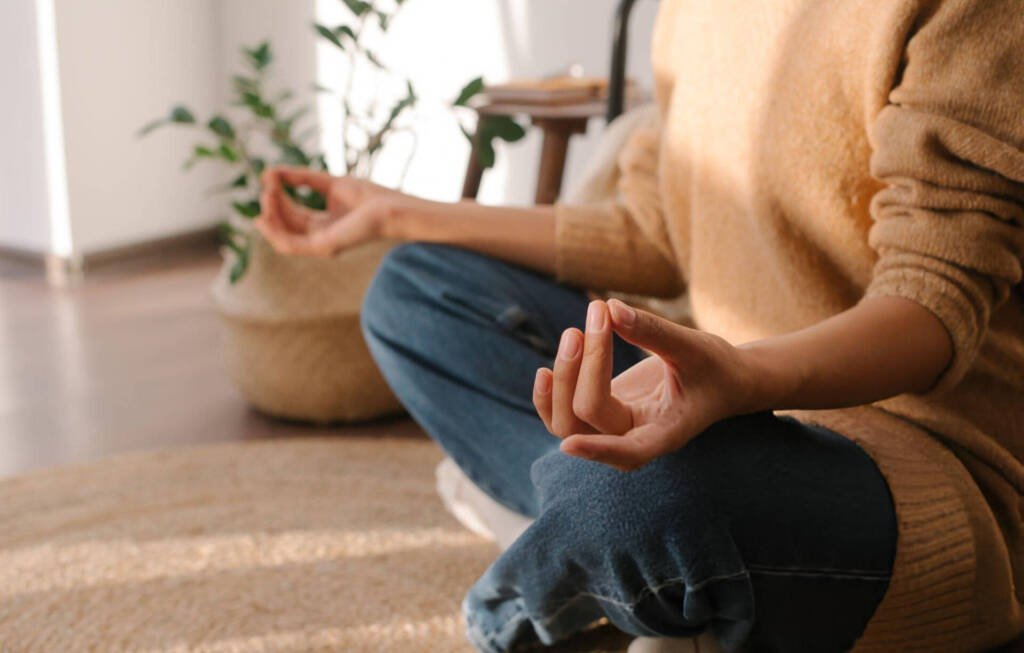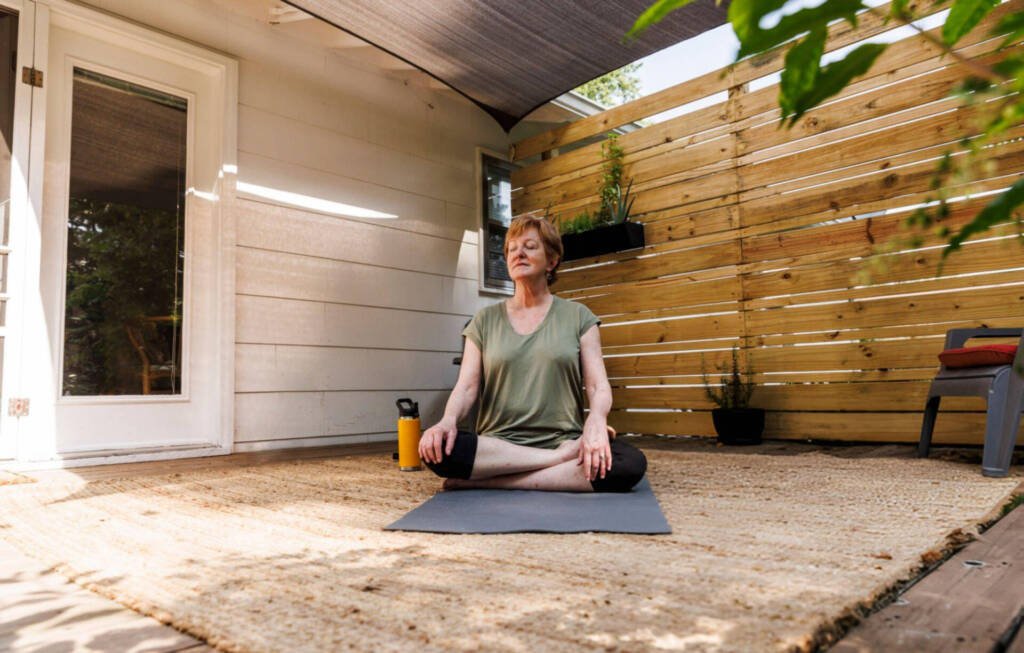Depression is an invisible affliction that touches the lives of millions globally, reaching across cultures, ages, and socio-economic backgrounds. It’s more than just feeling sad; it’s a profound condition that can significantly disrupt daily life, affecting one’s ability to work, connect with others, or enjoy activities that once brought joy. Everyday tasks, such as getting out of bed or preparing a meal, can seem insurmountable under its weight. Yet, amid this challenging landscape, hope can be found in alternative approaches to managing symptoms.
Table of Contents
But what if there were a natural way to alleviate these symptoms—an approach rooted in mindfulness and meditation? This ancient practice, with its roots in various cultural traditions, encourages individuals to focus on the present moment, promoting a sense of calm and self-awareness. This blog investigates whether meditation can alleviate depression with the support of studies outlining its potential advantages and helpful advice for incorporating meditation into daily life.
The Link Between Meditation and Depression

Depression manifests through various symptoms, including persistent sadness, loss of interest in activities, fatigue, and difficulty concentrating. These symptoms severely affect the quality of life, making management crucial. Meditation, an ancient practice with roots in various cultures, has gained attention as a promising tool for mental health management.
Meditation involves focused attention, relaxation, and heightened awareness. These practices are believed to positively influence the mind by promoting relaxation, reducing stress, and enhancing overall mental well-being. But how exactly does meditation intertwine with depression relief?
Meditation is thought to influence mental health by altering brain function and chemistry. Regular practice can enhance areas of the brain associated with emotional regulation, self-awareness, and stress reduction. This sets the stage for exploring the evidence connecting meditation with improved mental health.
Can Meditation Help with Depression? Exploring the Evidence

Scientific studies have increasingly linked meditation with mental health improvements. Research indicates that meditation can reduce symptoms of anxiety and depression, improve mood, and enhance overall psychological resilience. For example, a study published in JAMA Internal Medicine found that mindfulness meditation can significantly reduce symptoms of depression and anxiety.
Brain imaging studies also reveal changes in the brain structure and function among those who meditate regularly. Areas such as the prefrontal cortex and hippocampus, which play critical roles in regulating emotions and memory, show increased activity and density. These changes may help enhance emotional control and resilience, offering a buffer against depressive symptoms.
Beyond scientific evidence, countless individuals have shared personal stories of how meditation has helped them manage depression. These anecdotes, while subjective, provide compelling insight into the real-world impact of mindfulness practices on mental health.
Mindfulness Techniques for Managing Depression

Mindfulness, a core component of meditation, revolves around present-moment awareness and acceptance without judgment. This approach can be particularly beneficial for those dealing with depression, as it encourages a non-reactive stance toward negative thoughts and emotions.
Mindful Breathing

Mindful breathing involves focusing intently on the breath to anchor the mind in the present moment and heighten awareness of one’s immediate experience. Individuals can cultivate a greater sense of calm and presence by paying attention to each inhale and exhale. This practice is known to help calm the nervous system by activating the body’s relaxation response, reducing stress levels and fostering a sense of inner peace. As a result, mindful breathing becomes a powerful tool for managing symptoms of depression and improving overall mental well-being.
Body Scan Meditation

Body scan meditation is a mindfulness technique where you mentally traverse your body from head to toe, attentively observing sensations without judgment. As you move through each part, from the top of your head to your toes, you notice any feelings, tensions, or discomforts that emerge. This practice cultivates a profound and mindful connection with your body, enhancing awareness of your physical state and promoting relaxation, which aids in alleviating physical tension and stress, which are often linked to depression. Regularly practicing body scan meditation can foster a greater sense of well-being and mindfulness in everyday life.
Loving-Kindness Meditation

Loving-kindness Meditation is a mindfulness practice that emphasizes the cultivation of feelings of compassion and love toward oneself and others. During this meditation, individuals typically focus on generating kind and thoughtful intentions by repeating specific phrases or visualizing loved ones and even those with whom they have conflicts. This practice aims to counteract feelings of self-criticism and loneliness, which are common in depression, by fostering a profound sense of connectedness and empathy.
Mindful Walking

Mindful walking encourages awareness of each step and the sensations of movement, such as the feeling of your feet touching the ground and the rhythm of your breathing. This technique combines physical activity with mindfulness by focusing on the present moment, offering a gentle way to integrate meditation into daily life. It can be practiced anywhere, whether you’re in a peaceful park or simply walking down the street. Over time, mindful walking can enhance overall well-being by reducing stress, improving mental clarity, and fostering a deeper connection with the environment.
Practical Tips for Beginners: Starting Your Mindfulness Journey

Creating a conducive environment for meditation is essential for its success. Choose a quiet space free of distractions where you feel comfortable and relaxed. This setting will help you focus and deepen your practice.
Setting realistic goals and expectations is crucial. Start with short sessions, gradually increasing the duration as you become more comfortable. Consistency is more important than length; even a few minutes of daily practice can yield significant benefits over time.
For beginners, aim for 5-10 minutes of meditation daily. As you progress, you can extend this to 20-30 minutes. The key is to find a routine that fits your lifestyle and allows you to practice regularly without feeling overwhelmed.
Benefits and Challenges of Using Meditation for Depression

Meditation offers numerous benefits for those struggling with depression. It can improve mood by promoting relaxation and reducing stress. Enhanced self-awareness through mindfulness helps individuals recognize damaging thought patterns and develop healthier responses. Additionally, meditation fosters a sense of inner peace and emotional resilience.
However, meditation has its challenges. Some common misconceptions include the belief that meditation requires complete stillness or an obvious mind. In reality, it’s normal for thoughts to arise during meditation; the goal is to observe them without attachment.
Staying motivated can also be challenging, especially when dealing with depression. To overcome these obstacles, consider joining a meditation group or using guided meditation apps. These resources can provide structure and support, making it easier to maintain a consistent practice.
Conclusion
Meditation holds promise as a natural, holistic approach to managing depression. By understanding its benefits and incorporating mindfulness techniques into your daily routine, you can explore new mental health and well-being avenues. If you’re new to meditation, start small, be patient with yourself, and stay consistent.
Curious to learn more? Explore different meditation practices and observe the changes in your mental health. And if you’re ready to take the first step in your mindfulness journey, resources like books, apps, and online courses can provide valuable guidance and support. The path to better mental health may be just a breath away.





